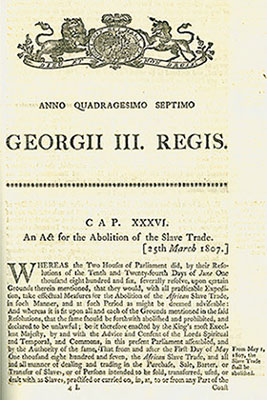1.1.1 Abolition of slavery
The beginnings of the abolition movement, which aimed at the universal abolition of slavery, took place in the late eighteenth and early nineteenth centuries. In Europe, the French Declaration of the Rights of Man and Citizens 1789, a fundamental document of the French Revolution, was first to declare the equality of all people. Article 1 of the Declaration stated: ‘Men are born and remain free and equal in rights’. While the Declaration did not explicitly refer to the abolition of slavery, it marked the beginnings of guaranteeing equality and freedom to all people, without distinction – a principle, which is the cornerstone of modern international human rights law. France officially abolished the slave trade in 1818.
In Britain, various efforts were made to advocate the prohibition of slavery. In 1789 (just a few months prior to adoption of the French Declaration), William Wilberforce gave a famous speech on abolition of slavery before the House of Commons. This led to the enactment of the Abolition of the Slave Trade Act 1807, prohibiting the slave trade in the British colonies as well as making it illegal to carry slaves in British ships.
Activity 2 Somerset v Stewart (1772) 98 ER 499
Question 1
Read the case of Somerset v Stewart (1772) 98 ER 499 [Tip: hold Ctrl and click a link to open it in a new tab. (Hide tip)] . Consider the facts of the case, the arguments advanced by Mr Hargrave and the judgment of Lord Mansfield.
What were the facts of this case? Outline the facts in no more than 120 words.
Discussion
The case concerned a black slave from Virginia, Mr Somerset, who was brought to London in 1769 by Mr Stewart, then his master. After two years in England, Somerset escaped his master. Stewart arranged to have Somerset captured and put on Captain Knowles’ ship, which was bound for Jamaica. Several British abolitionists intervened on behalf of Somerset. They filed a habeas corpus writ, a legal petition that required the Court of King’s Bench to review the legality of a prisoner’s detention. The question before the Court was whether the detention of Somerset by Stewart was lawful.
Question 2
What was Britain’s legal position regarding slavery at the time? Was it prohibited?
Discussion
Slavery was not legally abolished in Britain at that time. However, Hargrave argued that the law of England is not applicable to the slavery of British colonies in America, or in other countries (p. 501). He indicated that while slavery might be permitted in the colonies, it was not permitted by the law of England.
Question 3
What were the arguments advanced by Mr Hargrave for Somerset’s freedom?
Discussion
Hargrave’s arguments start by outlining the common elements characterising slavery and its detrimental impact, focusing especially on the moral aspects of it. Hargrave relies on the opinions of (then) modern writers on slavery and its rather limited utility. He then considers the lawfulness of slavery and relies on Locke’s approach against slavery. He states: ‘[it is] very doubtful whether the laws of England will permit a man to bind himself by contract to serve for life: certainly will not suffer him to invest another man with despotism, nor prevent his own right to dispose of property’ (p. 500).
Question 4
What was held in this case? How does the judgment inform you about the attitude towards slavery in 1772 in Britain?
Discussion
It was held by Lord Mansfield that Somerset was illegally detained and was free to be discharged.
The decision of Lord Mansfield was a great victory for the abolitionist movement. It was interpreted by the public and later justices as having the effect of abolishing slavery.
Britain forbade slavery across the British Empire in 1833 following the enactment of the Act for the Abolition of Slavery 1833. The adoption of this legislation granted freedom to all slaves in Britain and made slavery illegal.
Steps towards the abolition of slavery were also taken overseas. Following the uprising of slaves in 1791, Haiti (a French colony at the time) became one of the first colonies to abolish slavery. In the United States of America, the US Congress forbade the importation of slaves in 1808. In 1863 the US President, Abraham Lincoln, issued the Emancipation Proclamation (1863), declaring ‘all persons held as slaves within any State or designated part of a State, the people whereof shall then be in rebellion against the United States, shall be then, thenceforward, and forever free’. However, it was not until the end of the Civil War in 1865 that the 13th Amendment to the United States Constitution abolished slavery and involuntary servitude in the United States. The 13th Amendment stated that ‘Neither slavery nor involuntary servitude, except as a punishment for crime whereof the party shall have been duly convicted, shall exist within the United States, or any place subject to their jurisdiction’, effectively rendering slavery illegal in the United States.
The last country in the world to abolish slavery was Mauritania in 1981.

